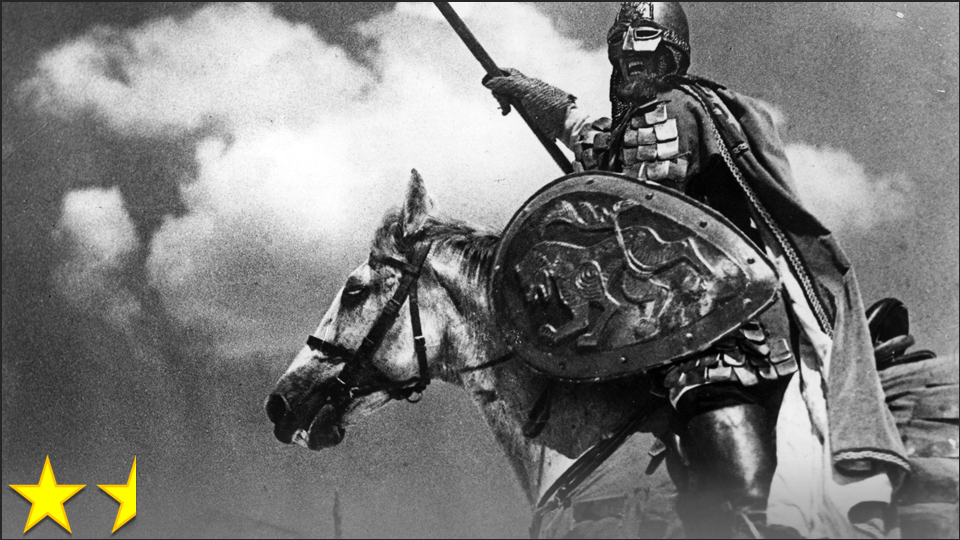I haven’t reviewed many foreign films yet. I know I’ve done my fair share of British movies, but Amelie and Passion have been my only reviews of films in foreign languages (to my memory). I’m going to change this. I expect to be bouncing around the globe for my next few reviews, and a good way to start a world tour of cinema is with Eisenstein. Seeing as how this man’s work is taught in every film class, I was hoping that Alexander Nevsky, his classic 1938 epic about a war hero in the 1200s, would be a bit more … well, epic.
I’m faced with a serious problem here because this film has brought to the surface a conflict between my ideology and my views on art. It has been my strong opinion for quite some time that a work of art should not be judged by its message alone, but by how well it conveys it. For example, someone might agree with the general message or theme in God’s Not Dead, but he/she should still recognize that it’s a remarkably horrendous piece of angel dung. Similarly, one does not have to be a racist to appreciate D.W. Griffith’s contributions to the cinematic arts as seen in Birth of a Nation. In music, I can appreciate old rock songs that focus on men who don’t seem to be exceptionally respectful towards women. (I should note that I’m not referring to particularly misogynistic songs, but instead songs such as “The Wanderer” or “Lightnin’ Strikes” that take infatuation to a rather uncomfortable level of objectification. However, in all fairness, some songs from this time by female artists – The Chordettes’ “Mr. Sandman,” for example – seem to indicate that this kind of attraction went both ways at the time.) The key thing about song lyrics, however, is to be watchful of songs that are actually character studies, and often consequently period pieces, which are written and performed from the perspective of the character being analyzed and explored (not necessarily the artist’s view).
It only makes sense, then, that I would have to approach Alexander Nevsky with the same stance, focusing on the craft more than the conclusion, but alas, I am unable to appreciate anything about this film because I am so overwhelmed by its disgusting ideology. I have spent much time pondering this, and I think I have realized a few factors that have been at play in my analysis of art. The first factor is the way the film sees itself. This may seem odd, but I think that movies nearly always have a way that they “feel” about their own contents, and while 2001: A Space Odyssey has a very conceited view of itself, Dr. Strangelove clearly thinks that the events it displays are absurd, and it critiques them for such. So, Eisenstein could have made a movie that analyzed the people of the time period objectively (without sharing in their perspective or criticizing them), and he could have made it as a critique of their ways, but instead he played along with their loony nationalism and gave them the operatic choir they desired. Secondly, if a work of art has a serious flaw in its point of view, I can still appreciate it as art if it supplies enough other elements that make me respect it in a different way. “My Sweet Lord” redeems itself, and I therefore greatly appreciate it, but “Anaconda” offers no such merit, and therefore leaves us only with the words to be analyzed.
Lo and behold, there may not be as much contradiction in my views as I had feared. I do think that Eisenstein did put together a work that is quite impressive, but not to the extent that it redeems its dogmatic, propagandic nature. To its credit, it surprised me by taking a sharp turn in the way it handled the awkward (and somewhat sexist) storyline of the men who made a girl choose which of them would be her husband. As it turns out, one of the men decides that he would rather be with a different woman – the one who fought bravely and competently in the battle. This not only gives us a strong, courageous female character to enjoy, but also takes away a touch of the “shallow” feeling in the film’s romantic affairs. Still, the redeeming quality throughout is bravery, and since I am no fan of bravery, I cannot comply to Eisenstein’s persistent demand that I wallow in the imagined elegance of prideful war.


